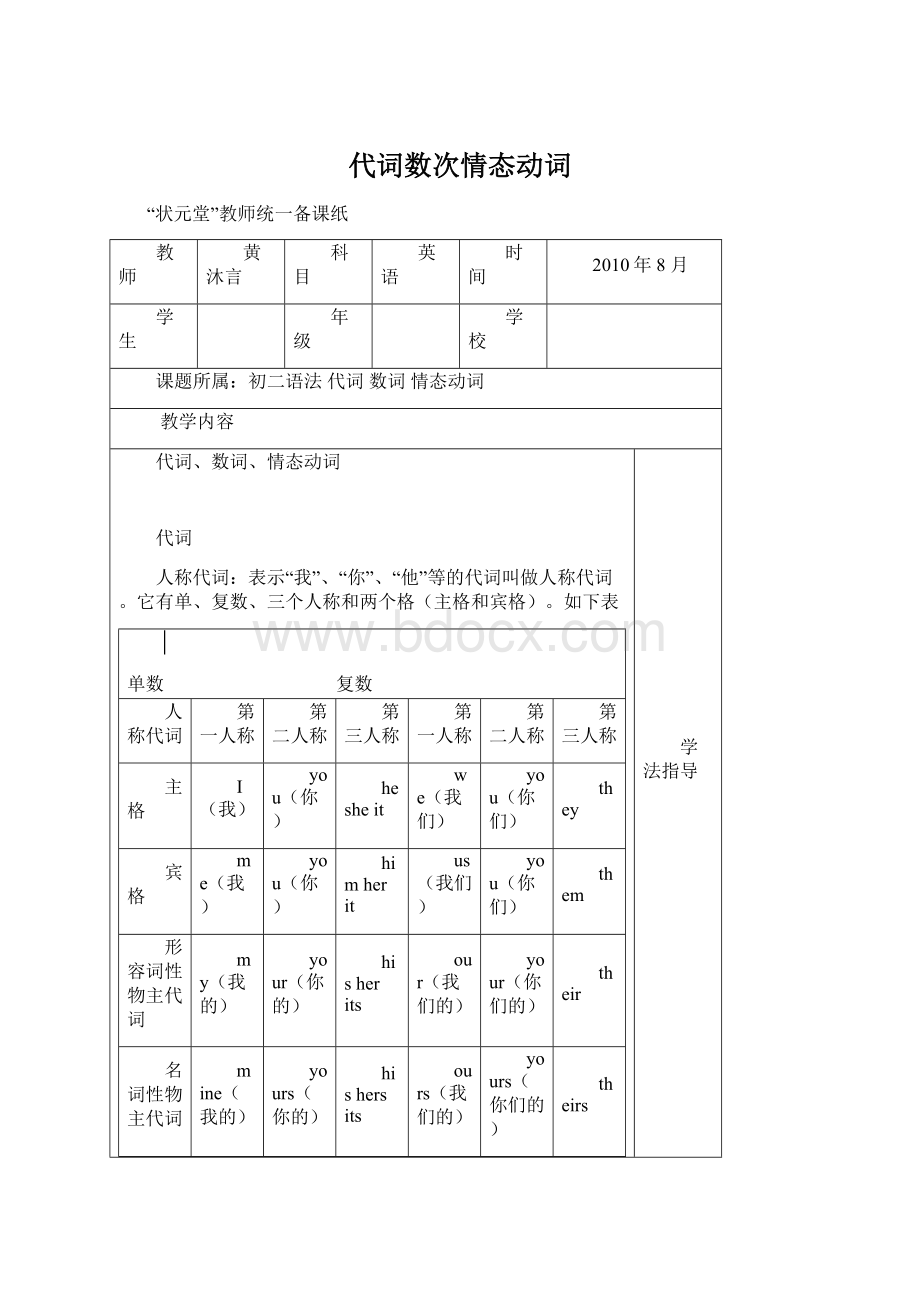代词数次情态动词.docx
《代词数次情态动词.docx》由会员分享,可在线阅读,更多相关《代词数次情态动词.docx(24页珍藏版)》请在冰豆网上搜索。

代词数次情态动词
“状元堂”教师统一备课纸
教师
黄沐言
科目
英语
时间
2010年8月
学生
年级
学校
课题所属:
初二语法代词数词情态动词
教学内容
代词、数词、情态动词
代词
人称代词:
表示“我”、“你”、“他”等的代词叫做人称代词。
它有单、复数、三个人称和两个格(主格和宾格)。
如下表
单数 复数
人称代词
第一人称
第二人称
第三人称
第一人称
第二人称
第三人称
主格
I(我)
you(你)
hesheit
we(我们)
you(你们)
they
宾格
me(我)
you(你)
himherit
us(我们)
you(你们)
them
形容词性物主代词
my(我的)
your(你的)
hisherits
our(我们的)
your(你们的)
their
名词性物主代词
mine(我的)
yours(你的)
hishersits
ours(我们的)
yours(你们的)
theirs
反身代词
myself(我自己)
yourself(你自己)
himselfherselfitself
ourselves(我们自己)
yourselves(你们自己)
themselves
学法指导
用法:
1.格人称代词在句中作主语。
例如:
I(We,You,They)likeswimming.我(我们,你/你们,他们)喜欢游泳。
He(She)isadoctor.他(她)是医生。
Thisisanewdictionary.Itisveryusefultostudents.
这是一本新词典。
它对学生很有用。
2.宾格人称代词在句中作动词宾语或介词宾语。
例如
Mr.Smithteachesus(them)English.
史密斯先生教我们(他们)英语。
(作动词宾语)
Iboughtapresentforher(him).
我给她(他)买了一件礼物。
(作介词宾语)
Who’sknocking?
谁在敲门?
It’sme.是我。
ItisshewhohelpsmewithGerman.
是她帮助我学德语。
3.主格和宾格人称代词的某些固定用法。
IwishtospeaktoBetty
我想和贝蒂通话。
人称代词单独使用或在not后,多用宾格。
例如
Ilikemusic.我喜欢音乐
Metoo.(Ido,too.)我也喜欢。
Havemoretea?
再来点茶吗?
Notme.我可不要了。
4.人称代词应与所代名词的性、数一致。
例如:
Mysistersaidthatshewouldcomesoon.妹妹说她不久要来。
MikeandMaryarereadingthere.Theyarebothmyfriends.
迈克和玛丽在读书。
他们都是我的朋友。
5.形容词性物主代词的用法相当于形容词,在句中只能做定语。
例如:
Ilovemyteacher. 我爱我的老师。
Your(His,Her,Their)booksareonthedesk.
你的(他的/她的/他们的)书在书桌上。
Ourschoolisnotfarfromhere.
我们学校离这儿不远。
6.名词性物主代词相当于名词,它后面不能再跟名词。
它在句中可用作主语、表语、宾语,与of构成短语作定语。
例如:
Ourroomisonthefirstfloorandyours(theirs)onthesecond.
①人称代词一览表
主格
宾格
形容词性物主代词
名词性物主代词
反身代词
I
me
my
mine
myself
you
you
your
yours
yourself
He
him
his
his
himself
She
her
her
hers
herself
It
it
its
its
itself
We
us
our
ours
ourselves
you
you
your
yours
yourselves
they
them
their
theirs
themselves
②little,alittle,few,afew
little,alittle修饰不可数名词;few,afew修饰可数名词。
little,few含义是否定的,意思是“很少“;alittle和afew含义是肯定的,解释为“有一点,有一些”。
③带some的词用于肯定句中,带any的词用于否定句和疑问句中。
④不定代词的修饰语要后置。
⑤no在句中只能做定语,修饰名词。
⑥辨析:
one…another,one…theother,one…theothers,some…others
knowisonething,buttoteachisanother.
I’mgoingtotellastoryabouttwomen.Oneisfat,theotheristhin.
Oneoftheboyswentswimmingwhiletheothersplayedfootball.
Somepeoplecamebycar,otherscameonfoot.
⑦辨析:
bothof…两者都,neitherof…两者都不,eitherof…任一(两者),both…and…,两者都,neither…nor…既不…也不,either…or…或者…或者…
Bothofusareverytired.
Neitherofthestorieswere(orwas)true.
CaneitherofyouspeakEnglish?
Bothmyfatherandmymotherareteachers.
Heneitherdrinksnorsmokes.
HeiseitherJapaneseorChinese.
指示代词
this(这个)that(那个)these(这些)those(那些)
疑问代词
who(谁)whom(谁)what(什么)which(哪个)whatever(无论什么)
whose(谁的)whoever(无论谁)whichever(无论哪个)
连接代词
who(谁)whom(谁)whose(谁的)what(什么)which(哪一个)
关系代词
who(指人,做主语)whom(指人,作宾语)whose(指人作定语)
what(没有先行词的关系代词)which(指物)that(指人或物)
相互代词
eachother(相互)(宾格) eachother’s(相互的)(所有格)
oneanother(相互)(宾格) oneanother’s(相互的)(所有格)
不定代词
one(某个人或物)ones(某些人或物) someone(某人)
somebody(某人) something(某事,某物)anyone(任何人)
anybody(任何人或物) anything(任何事或物)nothing(没事)
nobody(没人)noone(没人)none(没人)each(每个)everyone(没人)
some(某些)either(两者中任何一个)neither(两者中哪个也不)
both(两者都) all(三者以上都)
指示代词:
起指示作用的代词是指示代词。
指示代词有:
this,these,that,those,such,same.
7.this,these,that,those的用法
(1)this,these,that和those在句中可作主语,宾语,表语和定语。
例如
1)Thisisacomputer.这是一台电脑。
(主语)
2)Ilikethis(these),whileshelikesthat(those).我喜欢这个(这些),而她喜欢那个(那些)。
(宾语)
3)WhatIwantisthis(that)我要的是这个(那个)。
(表语)
4)Ilikethese(those)novels.我喜爱这些(那些)小说。
(定语)
注意
this和that有时可用作状语,表示程度。
意为“这么”和“那个”。
例如:
1)It’saboutthisheight它大约有这么高。
2)Ican’tspeakthatfast.我不能说那么快。
(2)this(these)和that(those)的用法区别。
this/these往往用来指空间或时间上较近的人或物;而that/those则指较远的人或物。
是比较。
1)ThisisamapofChinaandthatisamapoftheworld.这是一张中国地图,那是世界地图
2)Thesearejeeps.Thosearetrucks.这些是吉普车,那些是载重汽车。
3)Iwillgiveyoutheanswerthisweek.我会在本周内给你答复。
4)Theyarebusywithharvestingthesedays.他们这些日子忙于收获。
5)Lifewasdifficultinthosedays.往日生活很艰难。
(3)this和that可以指在电话中交谈的双方,或像it一样用来辨认某人是谁。
例如
1)Whoisthisspeaking?
(美)
2)Whoisthatspeaking?
(英)
请问你是谁?
——Who’sthat?
那是谁?
——It’sMissClark.是克拉克小姐。
(3)that/those有时用来代替前面说过的名词,以免重复。
例如:
1)TheweatherinShanghaiisnotsocoldasthat(=theweather)inBeijing.
上海的天气没有北京那么冷。
2)ThestudentsinClassTwoworkharderthanthose(=thestudents)inClassThree.
二班的学生比三班的学生学习更用功。
3)ThepopulationofChinaisaquarterofthat(=thepopulation)oftheworld.
中国的人口为世界人口的四分之一。
(4)such的用法
such用作指示代词,具有名词和形容词的性质,其单复数形式相同,在句中一般作定语和主语。
such表示“这样”;sucha表示“这样一个”;suchas表示“像…这样的…”。
例如:
作定语
1)Heisinterestedinsuchthings.他对这样的事有兴趣。
2)Idon’tlikesuchweather.我不喜欢这样的天气。
3)Theforeignvisitorssaidtheyhadneverseensuchcitiesbefore.这些外宾说,他们从未见过这样的城市。
4)Heissuchaman.他是这样一个人。
5)Itissuchanimportantmatchthatwecan’tmissit这个比赛如此重要,我们可不能错过。
6)Suchbooksasthesearerare.像这样的书是罕见的。
(也可以说:
Bookssuchasthese….)
注意
8.such作定语时,它所修饰的单数可数名词之前如有不定冠词a/an,这个不定冠词应放在such
之后。
9.such作定语时,在它所修饰的名词后面有时跟as做主语。
1)suchwasAlbertEinstein,asimplemanofgreatachievements.
阿尔伯特•爱因斯坦就是这样一个人,一个纯朴而又取得巨大成就的人。
2)Suchislife.生活就是这样。
3)Suchisourstudyplan.这就是我们的学习计划。
数词
数词分类:
数词包括基数词和序数词两大类。
基数词:
表示人或事物数量的词。
序数词:
表示事物顺序的词。
1.1—12的基数词是独立的单词,即:
one,two,three,four,five,six,seven,eight,nine,ten,eleven,twelve。
2.13—19的基数词以-teen结尾。
如:
fourteen,seventeen等,但13,15,18较特殊,13—thirteen15—fifteen,18—eighteen。
3.20—90的整十位均以-ty结尾。
如:
sixty,ninety,但20,30,40,50,80较特殊,20—twenty30—thirty,40—forty,50—fifty,80—eighty。
4.十位数与个位数之间要加连字符号“-”,如:
28—twenty-eight,96—ninety-six。
5.百位和十位(若无十位则和个位)之间加and,如:
148—onehundredandforty-eight406—fourhundredandsix。
注意:
hundred(百),thousand(千),million(百万),billion(十亿)等前面即使有具体的数词,也不能在它们的后面加s。
如:
600—sixhundred,8百万—eightmillion。
hundred,thousand,million用复数形式修饰名词时要用“of+复数名词”,如:
数以百计的年轻人hundredsofyoungpeople;数以千计的书thousandsofbooks。
其前面不能加具体的数词,但可加several或many。
基数词+单数名词+形容词构成合成形容词。
如:
一个五岁的男孩afive-year-oldboy;一座800米长的桥an800-meter-longbridge;女子400米接力girls'400-meterrelayrace。
序数词分别:
first,second,third,eight—eighthnine—ninth,five—fifth,twelve—twelfth,twenty—twentieth,forty—fortieth,twenty-five—twenty-fifth。
情态动词
①常用的情态动词有:
can,could,may,might,must,shall,should,will,would,need,dare,oughtto,hadbetter等。
②情态动词可表达建议、要求、可能和意愿等。
③情态动词没有人称和数的变化,即主语是第三人称单数时不加-s.
④情态动词必须和动词原形连用。
疑问句
疑问句可以分为一般疑问句、特殊疑问句、选择疑问句和反意疑问句四类。
①一般疑问句:
用Yes或No回答。
1)当谓语动词是be动词或be动词加其他谓语动词时,把be动词移到主语前,构成一般疑问句,如:
Washeveryhappylastnight?
2)当谓语动词是行为动词(实义动词)时,要借助于助动词do构成问句,然后再把原句中的谓语动词变为动词原形。
如:
DidyouwanttogotoXi’anlastyear?
3)当谓语动词是情态动词can,could,may,must等加动词原形时,把这些情态动词移到主语前,构成一般疑问句,如:
CanyousingthesonginEnglish?
②特殊疑问句:
用疑问代词或疑问副词开头,不能用Yes或No回答。
1)疑问代词有who,whom,whose,which,what等;
2)疑问副词有when,where,why,how等;
3)特殊疑问句朗读时用降调。
Whattimedoyouusuallygetup,Rick?
Howdotheygettoschool?
③反意疑问句
反意疑问句提出情况或看法问对方同不同意。
1)构成:
肯定陈述+否定疑问;否定陈述+肯定疑问
2)回答时Yes或No应根据事实而不是提问形式,这一点和中文相反。
Youaren’tateacher,areyou?
你不是老师,是吗?
Yes,Iam.不,我是。
No,Iamnot.是的,我不是。
④选择疑问句
1)用or连接询问的两部分,以供选择。
2)答案必须是完整的句子,不能用Yes或No。
Doyougotoschoolbybusorbybike?
回答应该是:
Igotoschoolbybus.或Bybike.
【模拟试题】(答题时间:
60分钟)
代词
(A)组:
词型转化
1.Pleaseshow____thewaytothehospital. (I)
2.Grandmaoftentells_______stories. (We)
3.Thisis________(she)room.(You)______isnextone.
4.Help_____tosomefish,children. (you)
5.Theyenjoyed_______inthepark. (they)
6.Hecandohishomeworkby_____. (he)
7.Welike________Englishteacher. (we)
8.Pleaselistento______carefully. (he)
(B)组:
单选
( )1.Isthispicture____?
A.my B.her C.yours D.our
( )2.Someof_______areworkers.
A.they B.their C.them D.themselves
( )3.Afriendof________camehereyesterday.
A.my B.his C.her D.your
( )4.Isaw______inthestreetyesterdayafternoon.
A.he B.his C.him D.himself
( )5.I’llgotosee______tomorrowmorning.
A.she B.hers C.her D.herself
( )6.Mr.Liteaches________English.
A.us B.we C.our D.ours
( )7.Theseare______books,______areoverthere.
A.I,you B.my,your C.my,yours D.mine,yours
( )8.Youcannotfinishthework________,Letmegiveyouahelpinghand.
A.youself B.yourself C.byyou D.youonly
( )9.Iwant_______bookstoread.Doyouhave__________?
A.some,any B.any,some C.any,any D.some,some
( )10.Ihavetwopens.Oneisred,__________isblue.
A.theother B.others C.other D.another
( )11.MikeandJoanare____________goodatmaths.
A.neither B.both C.other D.noone
( )12.Therearefiftypupilsintheirclass,_________ofthemareleaguemembers.
A.both B.Either C.all D.Noone
( )13.Myinventionisveryuseful.Whatabout______?
A.yours B.you